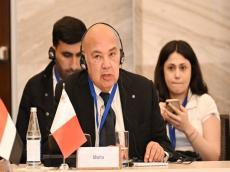|
|
TODAY.AZ / Politics
Malta's UNESCO president calls for addressing misconceptions about Azerbaijan
05 December 2024 [17:22] - TODAY.AZ

Raymond Bondin, President of the National Commission of Malta for UNESCO, emphasized the importance of countering prejudices and misconceptions about Azerbaijan by presenting the country’s realities.
He made these remarks during a panel session on "Restoration and Protection of Cultural Heritage," held within the framework of the II International Conference "Right of Return: Ensuring Justice for Azerbaijanis Forced to Deport from Armenia," organized by the Western Azerbaijan Community.
Highlighting the significance of heritage, Bondin stated, “Heritage is a set of features that characterize a people, and therefore it can be used as a means of sabotage in the hands of some malicious forces. Western Azerbaijanis should be very careful against such cases.” He cited the example of the destruction of the church in Shusha during the Armenian occupation, which was falsely attributed to Azerbaijan.
Bondin condemned the extensive destruction in Shusha, noting that mosques were used as stables during the occupation. “This is an unacceptable step. Azerbaijan is trying to carry out as much restoration work as possible to restore historical monuments to their original state. I have visited Garabagh, and the scale of destruction and the number of mines planted—over a million during the occupation—are staggering,” he remarked.
He also called for greater international involvement in preserving cultural heritage, drawing attention to the ancient caves in Garabagh that hold global historical significance. “This is not only about the history of Azerbaijan but the history of all mankind. Raising awareness in the international community about these efforts is essential,” Bondin added, emphasizing Azerbaijan's proactive initiatives in restoration and advocacy despite prevailing misconceptions.
Bondin concluded by urging the international community to recognize Azerbaijan's significant contributions to preserving heritage and confronting false narratives.
URL: http://www.today.az/news/politics/255385.html
 Print version
Print version
Connect with us. Get latest news and updates.
See Also
- 03 January 2025 [12:39]
Meeting held to boost Azerbaijani Diaspora activities in Austria - 03 January 2025 [11:42]
List of pre-election campaign meeting places for January 2025 Municipal Elections released - 02 January 2025 [17:55]
President Ilham Aliyev expresses condolences to President of Montenegro - 02 January 2025 [17:35]
Azerbaijan’s MFA extends condolences to Montenegro - 02 January 2025 [14:50]
Azerbaijan remembers national hero Polad Hashimov - 02 January 2025 [13:45]
President Ilham Aliyev, First Lady Mehriban Aliyeva view works carried out at "Lakeside" hotel at "Shahdag" tourism complex, and construction of "Ski Club" building [PHOTOS] - 31 December 2024 [16:17]
US Ambassador Mark Libby extends his congratulations to Azerbaijani people - 31 December 2024 [14:50]
Members of Estonian Parliament express condolences to Azerbaijan over plane crash - 31 December 2024 [14:39]
President of Republic of Suriname sends letter of condolences to President Ilham Aliyev - 31 December 2024 [12:23]
Defence Minister congratulates Azerbaijani Army
Most Popular
 President Ilham Aliyev expresses condolences to President of Montenegro
President Ilham Aliyev expresses condolences to President of Montenegro
 Tehran’s Anti-Azerbaijani Rhetoric Undermines Diplomatic Intentions
Tehran’s Anti-Azerbaijani Rhetoric Undermines Diplomatic Intentions
 Azerbaijan’s MFA extends condolences to Montenegro
Azerbaijan’s MFA extends condolences to Montenegro
 China's operating high-speed railway to hit 60,000 km by 2030
China's operating high-speed railway to hit 60,000 km by 2030
 Sweden sees surge in cocaine seizures amid growing global drug trade
Sweden sees surge in cocaine seizures amid growing global drug trade
 Azerbaijan remembers national hero Polad Hashimov
Azerbaijan remembers national hero Polad Hashimov
 Syrian Transitional Government open to international dialogue, says FM Esad Sheybani
Syrian Transitional Government open to international dialogue, says FM Esad Sheybani
